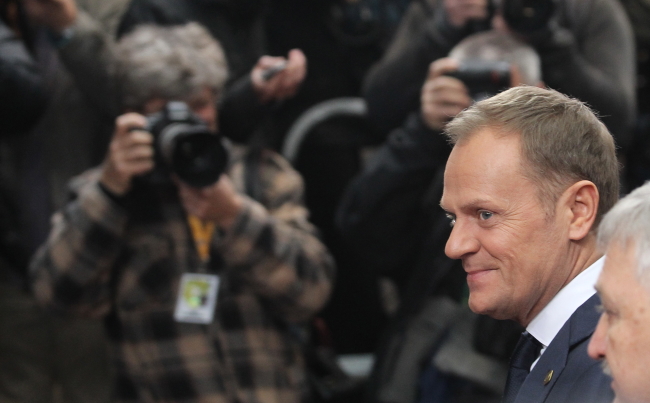
Donald Tusk in Brussels, Friday: photo - PAP/Radek Pietruszka
The two sides – those who want cuts to the 2014 – 20 budget worth around 1 trillion Euros, led by the UK and Germany, and those who want to maintain funding levels to poorer nations, led by Poland with some support from France - failed to agree a compromise deal, Friday.
A further summit on the budget will be organised for January next year.
“There is potentially a sufficient level of convergence on the EU budget for 2014-2020 to reach an agreement at the beginning of next year,” President of the European Council, Herman van Rompuy said after the talks broke down, late Friday afternoon.
“We should be able to bridge existing divergences of views. A European budget is important for the cohesion of the Union and for jobs and growth in all our countries,” he said.
He added that “further cuts” would have to be proposed before the next round of talks, however.
Polish Prime Minister Donald Tusk said that “one thing is satisfactory at this stage of the negotiations: everyone, without exception, agrees that any changes in the project to be submitted by Herman van Rompuy [before the next round of talks] will not include cuts to cohesion and common agricultural policy”.
Tusk told reporters that there was a willingness to reach an agreement - “I noticed there was no interest in trying to make the talks fail,” he said - but “national priorities” prevented further progress.
The UK's prime minister, David Cameron said at a press conference today that cuts in certain areas of the budget need not affect funding for Poland and other nations.
“Cuts can be made without going further on cohesion funds, which are vitally important for central and eastern European countries; nor do we have to go even further on the farming budget,” he said.
“But we must cut budgets while we are having to cut budgets at home,” he added.
It is believed he is asking for a budget 50 billion euro lower than was proposed by Herman van Rompuy last night.
Lithuanian President Dalia Grybauskaite, one of the recipients of funding payments, told reporters: "Net payers are not willing to accept [the proposed] level of payments and want the European budget cut even lower.”
Poland relies on so-called 'structural and cohesion funds' for around 50 percent of its public investment and is essential to growth prospects, says PAP English financial newswire editor-in-chief Glenn Tyrpa.
"EU cohesion and structural funds have been crucial for Poland's economic resilience, rising throughout the crisis period to a peak in 2011 and 2012,” he told thenews.pl, adding that the uncertainty caused by not having an agreement can damage confidence in the markets.
“Funds from the 2007-2013 perspective will likely be down for 2013 on the natural hiccup that comes between funding [periods] and, of course, a great deal of uncertainty still hovers over the new perspective to 2020." (pg)